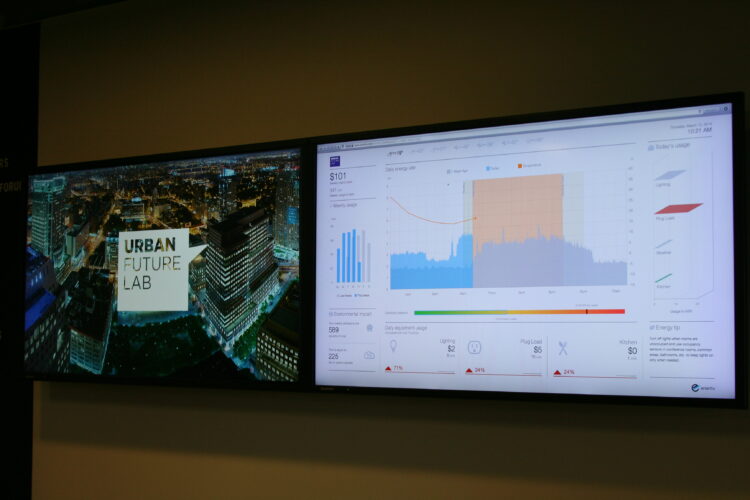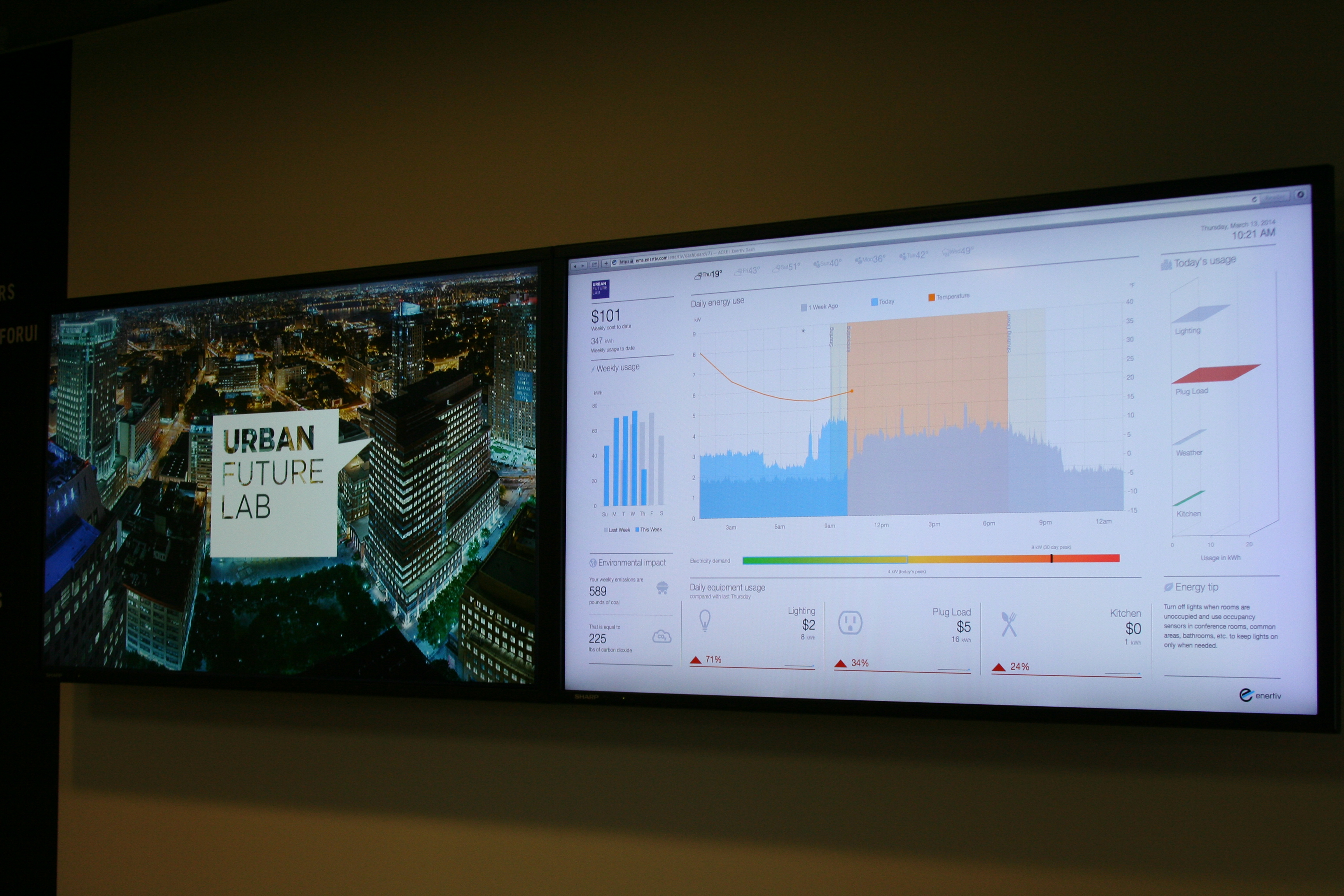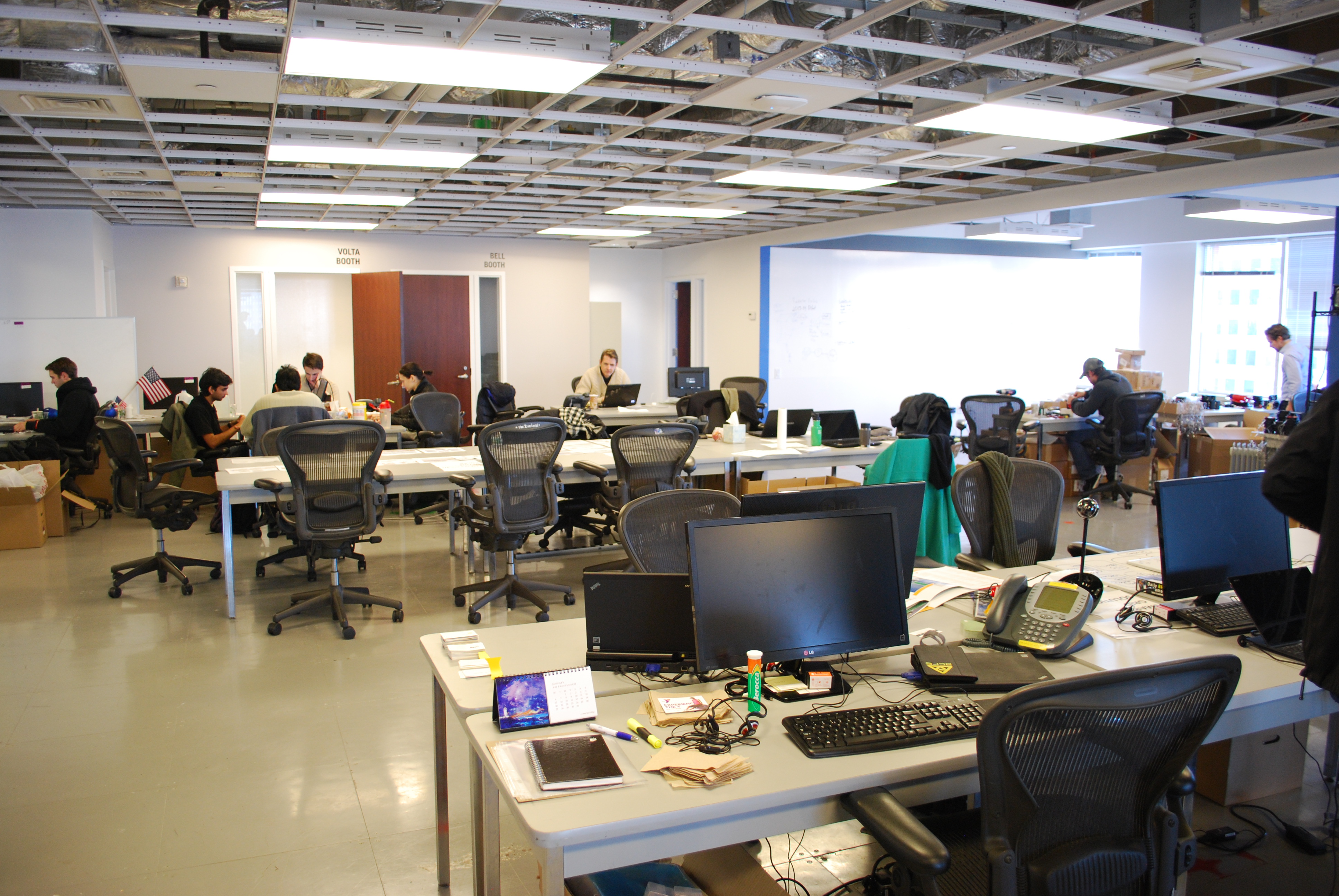There’s a new energy in Brooklyn and soon, hopefully, the world. The Urban Future Lab opened last week, providing 10,000 square feet of space to clean energy and sustainability startups.
Makes sense to focus on smart buildings in one of the real estate capitals of the world.
Located at NYU School of Engineering’s downtown Brooklyn campus in the heart of Brooklyn’s Tech Triangle, UFL is a partnership between NYCEDC and NYU School of Engineering and will provide incubation space for up to 20 start-up companies of NYC ACRE (New York City Accelerator for a Clean and Resilient Economy), an internationally recognized hub for entrepreneurs working in the areas of clean energy and sustainability.
The Lab also provides an exhibition space for emerging technologies, and serves as a destination for educational programs, job training seminars and workshops supporting a sustainable infrastructure and urban resilience.
The big plan: new tech creation – and job creation.
David Gilford, Director of Clean Technology & Energy at the New York City Economic Development Corporation, is here tell us about the new space – and how startups can become part of it.
Tell us about the program.
A partnership between NYCEDC and NYU School of Engineering, the Urban Future Lab is New York City’s first dedicated facility for sustainable infrastructure and urban resilience. Located in downtown Brooklyn, the Urban Future Lab is a business incubator that supports startup companies, showcases innovation, and provides educational and workforce training focused on sustainable infrastructure and urban resilience.
The Urban Future Lab combines a business incubation program with a product demonstration and exhibition space, while also offering crucial educational programming and job training workshops. NYU School of Engineering’s K-12 STEM education program provides New York City public school teachers with the skills to teach students in the fields of science, technology, engineering and mathematics, and Green City Force’s Clean Energy Corps prepares young adults from low-income backgrounds for careers related to sustainability. The creation and ongoing operation of the Urban Future Lab is expected to generate over 9,000 new jobs by 2025.
The Urban Future Lab is unique in 1) focusing on the specific needs of cleantech, sustainability and resiliency companies, 2) bringing together new and existing resources to create a focal point for the industry, and 3) linking these activities to educational and training opportunities for the broader community.
How do startups and companies apply?
Interested individuals or companies can apply through an application process on the Urban Future Lab website. Applications for new tenants at the Urban Future Lab incubator will be accepted and reviewed on a rolling basis until the incubator is at capacity. Upon reaching that stage, submitted application(s) for new tenant(s) will be reviewed on a periodic basis.
The Urban Future Lab is seeking seed stage or growth stage companies (or growth stage internationally-based company looking to enter the U.S. market) that are technology-enabled businesses (product and/or service) with a focus on efficiency, sustainability and urban challenges. These could include, but are not limited to:
- Energy storage, transmission, and distribution
- Waste to energy
- Smart grid
- Building systems and home automation
- Supply chain efficiency
- Lighting
- Advanced metering infrastructure
- Energy management
- Water and waste management
- Efficiency products and services
- Sustainable architecture and design
- transportation and power systems
- Urban food systems, sustainable agriculture and food safety
- Asset recovery including reuse and recycling energy/environmental markets
- Technology-enhanced business and financial services
Why did you choose Brooklyn?
The heart of New York University’s School of Engineering lies in Downtown Brooklyn, in the BK Tech Triangle. It makes sense for the Urban Future Lab to call this area its home.
Located in 10,000 square feet on the 19th floor of 15 MetroTech Center, the Urban Future Lab will house over 20 companies and 60 employees. NYU Polytechnic School of Engineering has a 5-year lease from Forest City Ratner, the property’s owner, who provides lease support.
The facility is within walking distance from the buzzing tech startup scene and research institutes such as the NYU Center for Urban Science and Progress.
What is the affiliation with NYU? How did this consortium come together?
Seeking to create new economic opportunity through solving challenges of sustainable infrastructure and urban resilience, NYCEDC and the New York University Polytechnic School of Engineering opened the Urban Future Lab.
The Urban Future Lab was conceived as part of NYCEDC’s comprehensive study of the green industry, including interviews with over 80 stakeholders, identifying a big economic opportunity that needed action to maximize its value to the city.
In 2013, NYCEDC selected the NYU School of Engineering through a competitive RFP process. The Urban Future Lab is managed through the NYU School of Engineering, under contract with NYCEDC.
National Grid and ADT Security Systems are major corporate sponsors, and NYSERDA indirectly provides funding through its support of the NYC ACRE and PowerBridgeNY programs.
In-kind support is also provided by the Downtown Brooklyn Partnership, Urban Green Council, Canadian Technology Accelerator, NYU Center for Urban Science and Progress, the Confederation of Danish Industry and the Brooklyn Chamber of Commerce, including programmatic support, mentors and staff time.
Tell us about your mentoring program.
The Urban Future Lab incorporates incubator mentorship from an advisory board composed of leading practitioners from NYU and across New York City. Additionally, tenants will receive mentorship and support through many of the Urban Future Lab programs:
Programming will establish it as the cultural center of the Clean and Resilient Technology industry in New York City. Programming at the Urban Future Lab will encompass all facets of the clean and resilient technology industry:
- Training and Classes through Green City Force
- K-12 STEM Education programming
- Cleantech to Market workshops
- PowerBridgeNY
- Grant Workshops
- Hackathons
- Demo Days and Agency Mixers
- Cleantech Open Northeast
- Future Energy Event Series
- Cleantech Perspectives from Global companies and executives
Tell us about some of the current startups that are in the space.
Bandwagon helps cost conscious travelers purchase seats in shared taxis and car services, at discounts of up to 60%.
BlocPower is focused on aggregating micro-portfolios of churches, synagogues, non-profits, small businesses and multifamily properties in financially underserved communities that have high energy costs, and connecting them to individual and institutional investors via an online platform.
DG Energy Partners (DGEP) is a solar industry focused financial advisory firm.
Energex Technologies is an environmental monitoring and management company with a mission to transform data center management.
Energy Solutions Forum is an energy policy research and data company.
Enertiv designs, manufactures, markets and installs real-time energy monitoring systems and software for commercial and institutional facilities.
HEVO Power is developing a wireless EV charging network for commercial fleets
Keen Home develops home automation products and services that are smartly designed, easy to use, and environmentally sustainable.
KW Energy is developing an analytic layer which takes the daily/hourly power forecasts, historic data, actual supply data and provides optimized Day Ahead bid information.
Lumiode is developing a brand new microdisplay platform that is 30 times brighter and 5-10 times more efficient than other technologies.
Radiator Labs is an early-stage start-up out of Columbia University developing a radiator retrofit for steam heating systems
REGEN Energy™ is a technology company founded on the basis of biomimicry, with an innovative and sophisticated take on energy efficiency.
Sistine Solar designs and builds handheld solar tiles that come in a variety of colors.
Smarter Grid Solutions works with a growing number of large power companies and utilities in the UK, mainland Europe and the US, running smart grid projects for both rural and urban electricity grids.
Voltaiq helps companies develop better, longer lasting energy devices.
- You’re open to startups from anywhere in the world participating in the program. What do they need to know about Brooklyn that makes it the place for them to be?
Brooklyn, and New York City in general, is unique in that it offers a set of benefits that can’t be found anywhere else. Firstly, New York City offers an ecosystem that nurtures startups. Businesses here are often right next to their customers and clients. This ecosystem encourages growth and expansion, helping startups to thrive. The New York City environment, and specifically the environment of the Urban Future Lab, also offers the opportunity for collaboration. When working within close proximity to likeminded people and companies, ideas grow to become bigger and better. In New York City, we also continue to cultivate the best and brightest workforce. This unmatched pool of talent is full of ideas and expertise, helping New York City to become a leader in so many fields. Brooklyn also has unmatched cultural, natural and community amenities. New York City’s infrastructure, education and public safety all make it the place to be.






